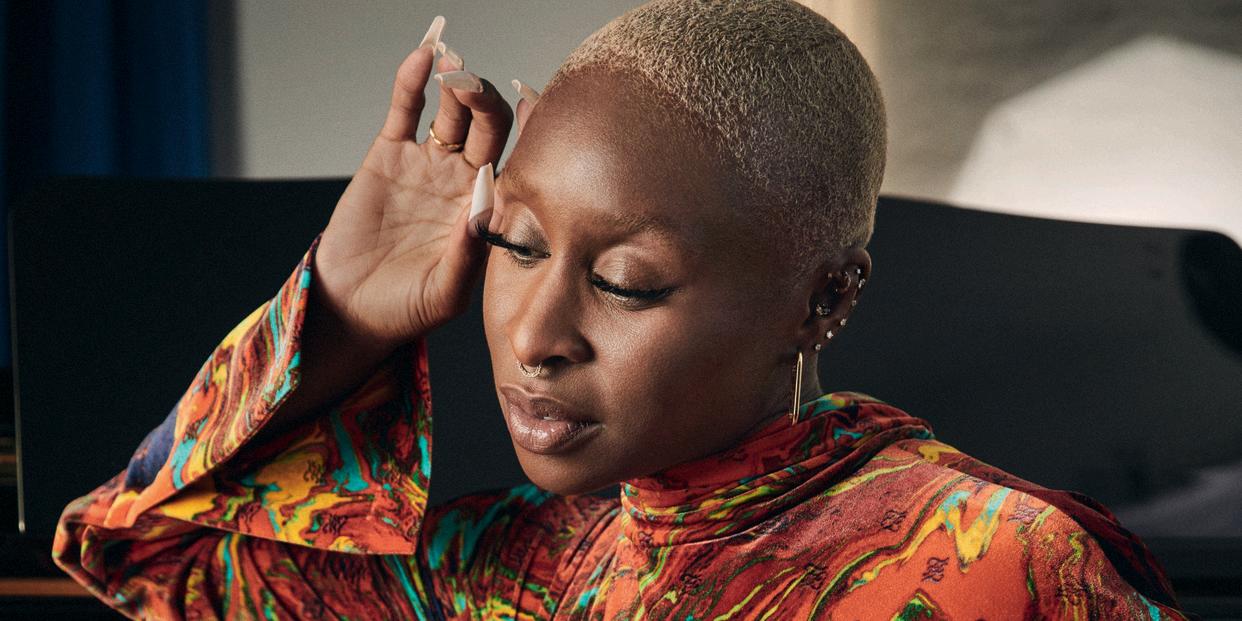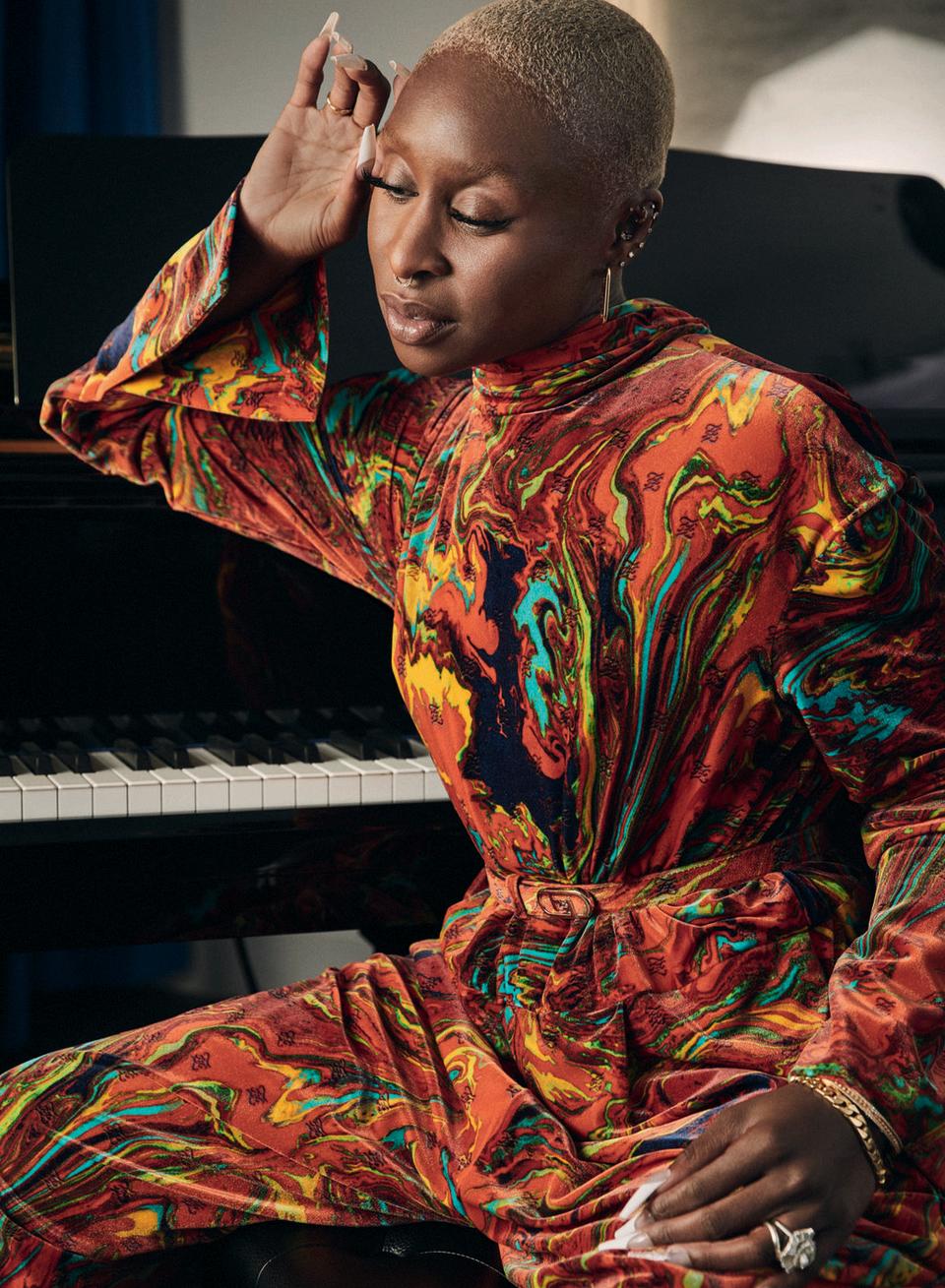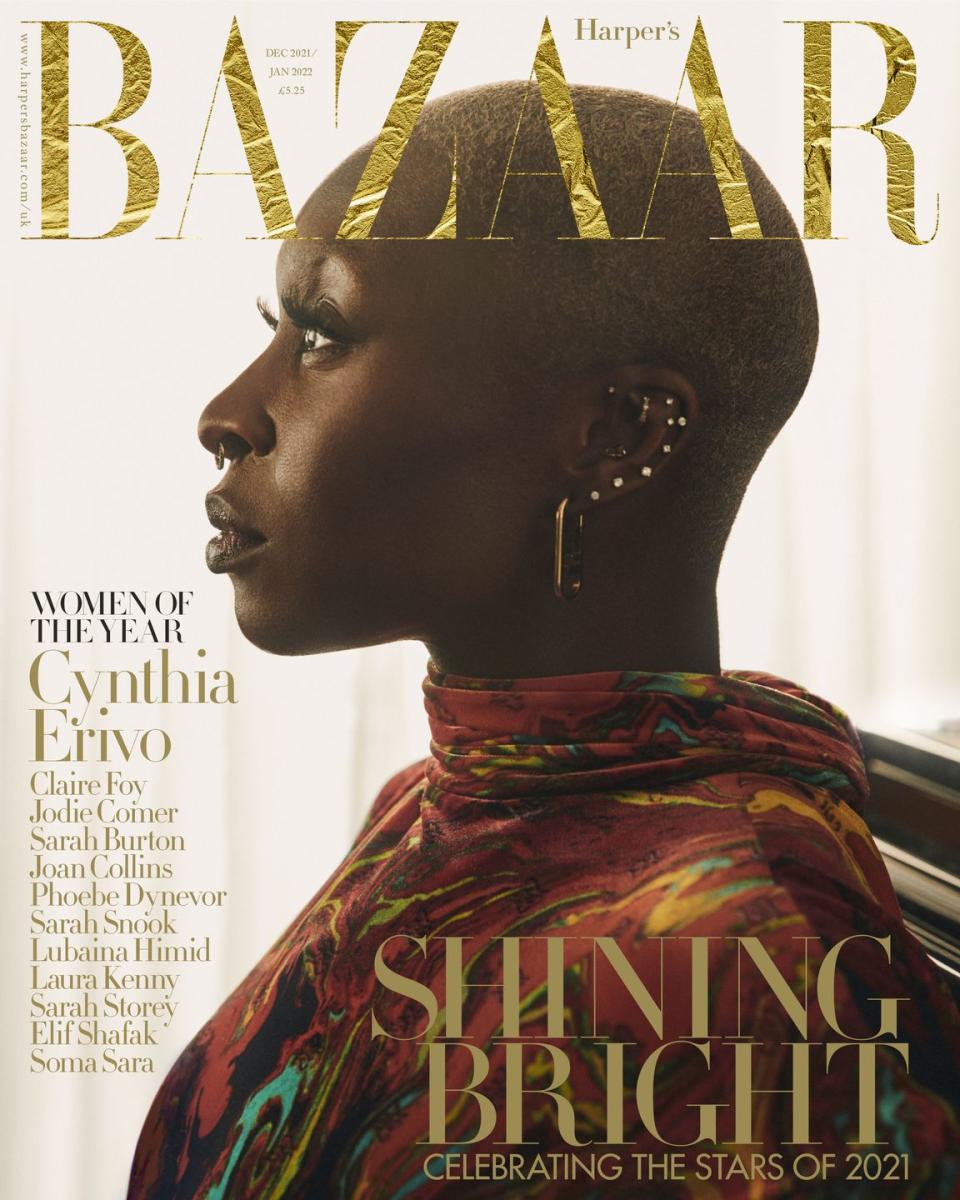Cynthia Erivo on her personal activism, recording her debut album, and becoming Aretha

It's 11am in Los Angeles when Cynthia Erivo and I connect over Zoom. The actress and singer-songwriter is sitting in her sun-drenched office, wearing no make-up but adorned with her trademark septum ring and a smile of openness and warmth. Her hair is a brilliant peroxide blonde and her face is aglow – possibly due to a runner’s high. "I just ran eight miles," she says. "That’s my regular morning ritual. If I do between four and 15 miles, I’m happy!"
It’s this energy that’s turned Erivo into the toast of Hollywood. Over the past three years, the 34-year-old’s profile has skyrocketed with a series of career-defining roles. Her first big-screen appearance was in Steve McQueen’s 2018 film Widows as the sassy single mother Belle. Next, she gave a brilliantly subtle turn in Bad Times at the El Royale, and in 2019, she starred as the abolitionist Harriet Tubman in the biopic Harriet, securing two Oscar nominations, one for the song ‘Stand Up’ and the other for Best Actress.
However, it’s in National Geographic’s series, Genius: Aretha, in which she plays Aretha Franklin, where she’s really been able to showcase her multitudinous skills, using her glorious, powerful voice, smooth as honey in a glass of malt whisky, and embodying the soul icon with ease. "I’ve been listening to Aretha since I was very little," she tells me. "Having the chance to learn her music with an understanding of her life was really special. I’d work through the songs, looking at the psychology of the woman who was singing and the choices she was making."
The series covers much of Franklin’s life from the Fifties until the late Nineties, shedding light on aspects of her life the public were not privy to. We witness her beginnings on the gospel circuit while traveling with her father, the barren years when she struggled to find her sound after signing with Columbia Records and the plenty that followed once she switched to Atlantic and covered hits like ‘Respect’ and ‘I Say a Little Prayer’. Franklin’s personal traumas take centre stage too: losing her mother at 10, having her first baby at 12, marrying a controlling and abusive husband, and the complicated relationship she had with her father – an outspoken, philandering preacher (played by Courtney B Vance) who spots his daughter’s talent early on and ensures that success is her only focus.
"I enjoyed getting the opportunity to know what made Aretha the person, which made Aretha the artist," Erivo says. "And yes, she compartmentalised her life but I get that. There are things that you should be able to keep just for yourself. Because there’s a strange thing that happens when you’re in the public eye, where it feels like a lot of what you have and do belongs to everyone. For your sanity, it’s good to be able to keep some things for yourself. I don’t mind sharing a lot, but so I can remain the happy person I am when you meet me, there are things I love that I only talk to the people I love about."

During the filming of Genius, any time she had spare was spent co-writing and recording her debut album, Ch. 1 Vs.1, a body of work Erivo talks about with unbridled happiness "[Lyrically] it’s a combination of stories but it’s definitely from my heart," she says. "Everything from relationships I’ve had, to a song about my mother and people I’ve met." She likes to write tucked away from the eyes of others: "I find a corner and just sit on the floor, I love being grounded when I’m writing." I wonder if getting into the psyche of the Queen of Soul helped Erivo with her own process? "Learning Aretha’s story and what she had been through gave me a boost of confidence with my own music," she says. "I felt empowered to do the things I wanted to. I wasn’t afraid to say, 'I don’t like that, I think we should do that again.' And learning her songs forced me to learn my own instrument. I discovered that there were [new] sounds and riffs I could do."
There are big, bold, beatific songs such as ‘Glowing Up’, in which she revels in the grit and glory of her achievements and invites us to do the same. There’s the celebratory ‘Mama’, and ‘Hero’ – a Black Lives Matter anthem with lyrics that reflect the energy of the movement including: ‘I can’t breathe’, the last words spoken by Eric Garner in 2014 and George Floyd in 2020. Then there’s the introspective ‘A Window’, in which she cries real tears and ‘You’re Not Here’, a meditation on loving her estranged father (who disowned her at 16) from afar.
Erivo’s parents immigrated to the UK in their early twenties from Nigeria. Her father left, and her mother Edith brought up Erivo and her younger sister Stephanie in Stockwell, south London. "Mum always said I sang before I spoke, but I don’t remember that" Erivo discovered the effect of her voice when she was in a nativity play, aged five."I had a solo [‘Silent Night’]. I loved that I got to sing a song by myself, and that this song made people smile and be happy."
Edith worked as a nurse, ensuring her daughters had a comfortable life. Erivo thinks growing up in an all-female household helped build her self-belief. "Often the world tells us [Black women] that we aren’t able to do certain things but when all you know is other women doing everything they want to, you realise, yeah I can too. My mum has a nice house and a car – I can get a nice house and a car. She’s got the job that she wants, I can get the job I want too. At no point did my mum say, 'You have to be a doctor,' you know how it happens," she says to me, leaning towards her screen. I know this only too well as a fellow first-generation British-born Nigerian.
There is almost an unspoken oath between us and our parents that we should become a doctor, a lawyer or an engineer; they endeavoured to give us opportunities, so we’re encouraged to follow traditional career paths. Erivo’s mother had a different stance,
though: "Mum said, 'If singing is what you want to do, then work really hard and do it well – make sure you’re the best at it.'" As Erivo neared her teens, she realised she wanted to act as well. "Acting came alive to me when I was around 11. I liked being able to tell the stories of others."

She went to Rada in her early twenties and after graduating, found her skills were in demand for musical theatre. She was cast as Celie in the Southwark-based Menier Chocolate Factory’s 2013 production of The Color Purple. Two years later, Oprah Winfrey and Quincy Jones brought the musical to Broadway. Erivo was the only member of the London cast taken Stateside. Her stellar turn and silken soprano captivated audiences and critics alike. In 2016, she won a Tony for Best Actress in a Musical. In 2017, a Grammy and Emmy followed.
For the past few years, Erivo has happily called America home. "It trips me out!" she says of the difference between London and LA. Where else would you wind up in Whoopi Goldberg’s dressing-room taking in her shoe collection? "She had this whole wall of Irregular Choice shoes!" Erivo tells me of the time she met the legendary actress and discovered her predilection for kitsch British footwear.
Erivo heads back to London whenever she can to see family and friends, and to visit the theatre, "I always go to the Young Vic and I love heading to Borough Market," she says. "In London, I’m still a local girl, but here [in LA] is where I’ve built my life. I do feel like it’s coming full circle though..." We discuss the mass exodus of Black British talent to America due to the lack of opportunities here. Does she think things will change? "I hope so," she says. "Otherwise Black actors will continue to leave and we’ll go wherever we will get acceptance." Last year, Erivo declined an invitation to perform ‘Stand Up’ at the Baftas. Its lyrics speak of freedom and equality (it was adopted by the Black Lives Matter movement during the marches), yet no Black actors were nominated in any of the categories. She said at the time that performing would "feel like I was doing a disservice to my peers".
Much of her work is an ode to activism – she has recently launched Edith’s Daughter, a production company, to tell hidden Black stories, and the first music video from Ch.1 Vs.1, for her song ‘The Good’, depicts a lesbian relationship through an authentic lens, reflecting the highs and lows of love.

On top of all this, Erivo has written a children’s book, Remember to Dream, Ebere, about a little girl who imagines the wonderful things she can do and be each night. Ebere is encouraged by her mother, as Erivo was. "I have two goddaughters and a lot of my friends have kids," she says. "I wanted to write something for them and anyone who needs encouragement and wants to know their dreams are valid."
I ask what her own dreams are following the release of Ch.1 Vs.1. She momentarily closes her eyes, opens them and paints the scene, her voice soft: "I see myself performing in front of a crowd, people are singing one of my songs and little lights are everywhere because their phones are lit up. I want people to talk about what stories of theirs come to life when they hear the songs, I hope that it connects with them. And I hope it wins a Grammy or two because it is my heart and soul."As 2022 unfolds, this dream is certain to become a reality.
‘Ch.1 Vs.1’ (Verve Records) is out now. The December issue of Harper's Bazaar is on newsstands from 5 November.
You Might Also Like


